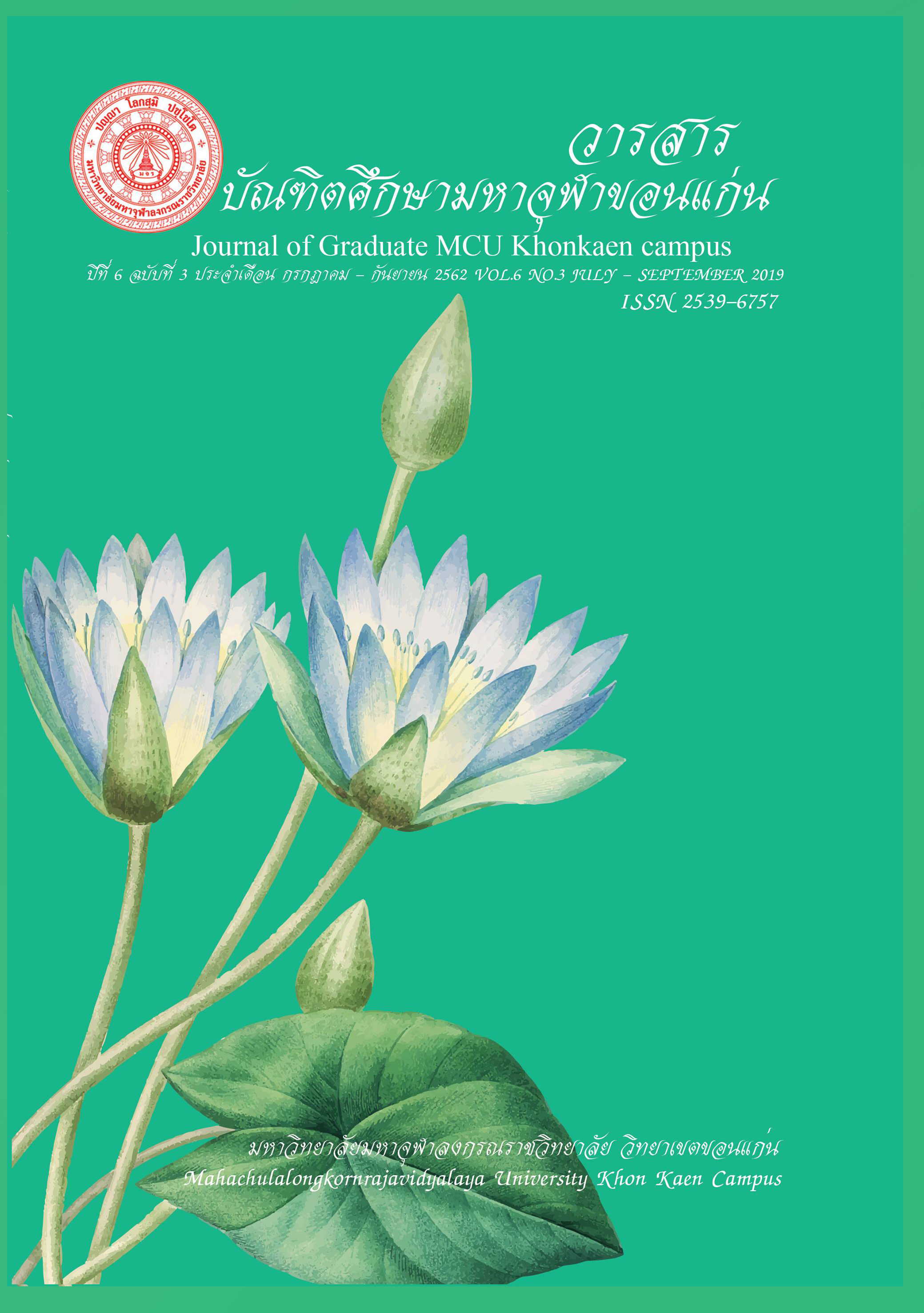ยุทธศาสตร์การบริหารสถานศึกษาโดยใช้แนวคิดชุมชนแห่งการเรียนรู้วิชาชีพ สังกัดสำนักงานเขตพื้นที่การศึกษามัธยมศึกษา เขต 25
Main Article Content
บทคัดย่อ
การวิจัยครั้งนี้มีวัตถุประสงค์1)เพื่อศึกษาสภาพปัจจุบันและสภาพที่พึงประสงค์ของการบริหารสถานศึกษาโดยใช้แนวคิดชุมชนแห่งการเรียนรู้วิชาชีพ สังกัดสำนักงานเขตพื้นที่การศึกษามัธยมศึกษา เขต 25และ 2)เพื่อพัฒนายุทธศาสตร์การบริหารสถานศึกษา โดยใช้แนวคิดชุมชนแห่งการเรียนรู้วิชาชีพ สังกัดสำนักงานเขตพื้นที่การศึกษามัธยมศึกษา เขต 25กลุ่มตัวอย่างที่ใช้ในการวิจัยครั้งนี้ได้แก่ สถานศึกษาในสังกัดสำนักงานเขตพื้นที่การศึกษามัธยมศึกษา เขต 25 ผู้ให้ข้อมูลประกอบด้วย ผู้บริหารสถานศึกษาจำนวน 16 คน และครูผู้สอนจำนวน335 คน รวมทั้งสิ้นจำนวน 351 คน ซึ่งได้มาจากตารางกำหนดขนาดกลุ่มตัวอย่าง สำหรับศึกษาสัดส่วนประชากรของ R.V.Krejcie & D.W. Morgan (1970)โดยใช้วิธีสุ่มตัวอย่างแบบแบ่งชั้นหรือชั้นภูมิ (Stratified Random Sampling)เครื่องมือที่ใช้ในการวิจัยเป็นประเมินองค์ประกอบ แบบสอบถามมาตรประมาณค่า 5 ระดับ มีค่า IOC ระหว่าง 0.80 - 1.00 ค่าความเชื่อมั่นเท่ากับ 0.98 สถิติที่ใช้ในการวิเคราะห์ข้อมูลได้แก่ ค่าเฉลี่ย ส่วนเบี่ยงเบนมาตรฐาน ค่าความเชื่อมั่น
ผลการวิจัยพบว่า
- สภาพปัจจุบันของการบริหารสถานศึกษาโดยใช้แนวคิดชุมชนแห่งการเรียนรู้วิชาชีพ สังกัดสำนักงานเขตพื้นที่การศึกษามัธยมศึกษา เขต 25โดยภาพรวมพบว่าอยู่ในระดับปานกลาง เมื่อพิจารณาเป็นรายด้าน มีสภาพปัจจุบันเรียงลำดับจากมากไปหาน้อย คือ ด้านการบริหารงานทั่วไปรองลงมา คือด้านการบริหารงานบุคคลและด้านการบริหารงานวิชาการตามลำดับ ด้านที่สภาพปัจจุบันต่ำที่สุดคือการบริหารงบประมาณ สภาพที่พึงประสงค์ของการบริหารสถานศึกษา โดยภาพรวมพบว่าอยู่ในระดับมากที่สุด เมื่อพิจารณาเป็นรายด้าน มีสภาพที่พึงประสงค์ในระดับมากที่สุดทุกด้าน เรียงลำดับจากมากไปหาน้อย คือ ด้านการบริหารงบประมาณ ด้านการบริหารงานบุคคล ด้านการบริหารงานทั่วไปตามลำดับ ด้านที่มีสภาพที่พึงประสงค์ต่ำที่สุดคือด้านการบริหารงานวิชาการ
2. ยุทธศาสตร์การบริหารสถานศึกษาโดยใช้แนวคิดชุมชนแห่งการเรียนรู้วิชาชีพ สังกัดสำนักงานเขตพื้นที่การศึกษามัธยมศึกษา เขต 25 เป้าประสงค์: บรรยากาศการเรียนรู้เพื่อขยายศักยภาพของตนเองและสมาชิกในชุมชนวิชาชีพอย่างต่อเนื่องประกอบด้วย 4 ยุทธศาสตร์ 23 กลยุทธ์ 23 ตัวชี้วัด ยุทธศาสตร์ที่ 1 ปรับเปลี่ยนการบริหารงบประมาณโดยใช้แนวคิดชุมชนการเรียนรู้วิชาชีพ เป้าประสงค์ : สนองตอบต่อภารกิจการจัดการศึกษาของสถานศึกษา ประกอบด้วย 5 กลยุทธ์ 5 ตัวชี้วัด ยุทธศาสตร์ที่ 2 การพัฒนาการบริหารงานวิชาการโดยใช้แนวคิดชุมชนการเรียนรู้วิชาชีพ เป้าประสงค์ : ยกระดับผลสัมฤทธิ์และพัฒนาผู้เรียนอย่างต่อเนื่อง ประกอบด้วย 7 กลยุทธ์ 7 ตัวชี้วัด ยุทธศาสตร์ที่ 3 ปฏิรูปการบริหารงานบุคคลโดยใช้แนวคิดชุมชนการเรียนรู้วิชาชีพ ชีพ เป้าประสงค์ : ตอบสนองภารกิจของสถานศึกษาภายใต้หลักการบริหาร เสมอภาค มั่นคงคุณธรรม ยุติธรรม ได้รับโอกาสพัฒนาอย่างเท่าเทียม ทั้งปริมาณและคุณภาพ ประกอบด้วย 5 กลยุทธ์ 5 ตัวชี้วัด ยุทธศาสตร์ที่ 4 เสริมสร้างการบริหารงานทั่วไปโดยใช้แนวคิดชุมชนการเรียนรู้วิชาชีพ เป้าประสงค์ : การบริการ สนับสนุน ส่งเสริม ประสานงาน ประชาสัมพันธ์ เตรียมความพร้อมด้านอาคารสถานที่และระบบเทคโนโลยีสารสนเทศ ภายในสถานศึกษาและชุมชนให้สนองตอบต่อการจัดกิจกรรมการเรียนการสอนประกอบด้วย 6 กลยุทธ์ 6 ตัวชี้วัด
Article Details
เอกสารอ้างอิง
2) 2002 and No. 3 (2010):Bangkok: Office of the Education Council.
_______. (2007). Guidelines for Decentralization of Administration and Educational Management to the Board: Office of Educational Service Area and Educational Institutions according to Ministerial Regulations prescribing rules and regulations Decentralization methods, administration and educational management.
Chalermchartmekdaeng, et al.(2015). Guidelines for Developing a Learning Community of
Private Education Institutions: Buabandit Journal of Educational Administration,
Ubon Ratchathani Rajabhat University. 15th Year, Special Vol. (October - December 2015).
Chirasaya Phetchuungmarka. (2017). Strategies for Using Change Leadership in Private Vocational Institutions Administration, Khon Kaen: Doctor of Philosophy, Program in Educational administration, Faculty of Education, North Eastern University.
Office of the National Economic and Social Development Board. (2560). Summary of Significance of National Economic and Social Development Plan, 12th Vol., 2017- 2564: Office of National Economic and Social Development Board.
Search from http://www.nesdb.go.th/ewt_news.php?nid=6420 (18 March 2017).
Rewadee Chaichaowarat. (2015). Way to Create Teachers to Students: Professional Learning Communities: Documentation of concepts and guidelines for teacher professional development for the project working group, mechanisms development and guidelines for supporting the professional learning community to develop learners. Bangkok: Office of Social Learning and Youth quality Promotion.
Secondary Educational Service Area Office 25. (2016). Needs Assessment Research: Searched on 10 November 2017.
Suwimol Wongvan. (2007).Needs Assessment Research: Bangkok: Chulalongkorn University Press.
Wichian Rooyuenyong, et al. (2016). Administration according to Good Governance Principles of Schools under the Secondary Educational Service Area Office 25: Journal of Education Khon Kaen University, 39th Year, Vol. 2 April 2016.
Woralak Chukamnerd. (2014). A Model of a Professional Learning Community of Teachers Toward 21st Century Learning of Schools in Thailand: Academic Service Journal, Prince of Songkla University, Pattani Campus. Vol. July-December 2014.
Vicharn Panich. (2012). Framework for the 21st Century Learning. Bangkok: Sod-Si Saritwong Foundation.

